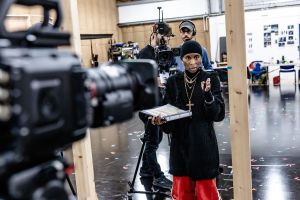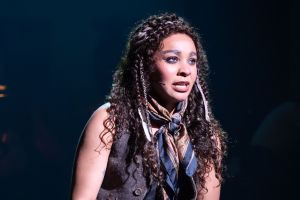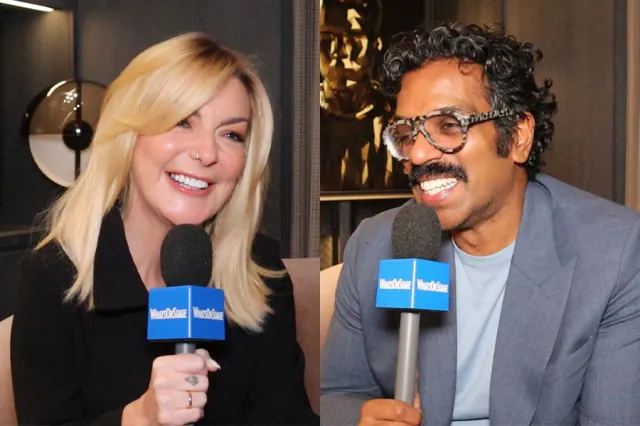20 Questions With…Dave Willetts
Dave Willetts, currently starring as Old Deuteronomy in Cats, talks about stage stamina & his pet musical project featuring a white mouse.
Dave Willetts is one of the world’s foremost musical performers. He is the only singer to have played the lead roles in major productions of both Boublil & Schonberg’s Les Miserables and Andrew Lloyd Webber’s The Phantom of the Opera.
Willetts received critical acclaim when he sang the role of Jesus in Jesus Christ Superstar at the Barbican, and performed the same role in a 1993 European tour. As well as recording a number of CDs, he has also performed many solo recitals besides starring in numerous other major shows.
Willetts recently joined the West End cast of Lloyd Webber’s Cats, the world’s longest running musical.
Date & place of birth
Born 24 June 1952 in Birmingham.
Now lives in…
Warwickshire
Trained at
Nowhere! I never had any lessons. When I was working in engineering, I sang in a dance band and did amateur dramatics. Whilst doing this, I was spotted and went straight into Les Miserables.
First big break
It would obviously have to be Les Miserables. I was in the original cast at the Barbican, and when we transferred to the West End, I took over the role of Jean Valjean. Also, doing The Phantom of the Opera opened a lot of doors for me.
Career highlights
I hope it hasn’t happened yet, because you’ve never done it all. That said, appearing on This Is Your Life and also having the opening night of The Phantom of the Opera going out on News at Ten were pretty special events.
Favourite production that you’ve worked on
It’s actually something I did a long time ago, and am working towards doing again. Charles Strauss, who wrote Annie, has a lesser-known piece called Charlie and Algernon. It was originally a film and played in London in the 1960s. It’s basically a play with music and I’m working on updating certain aspects of the book and songs. We’re in talks with one theatre about the possibility of staging it there, but as I’m tied up until 2002 it won’t happen before then.
Favourite director
I’m lucky enough to have worked with two of the greats in Hal Prince and Trevor Nunn. They work in different ways, with Trevor dealing in intimate character analysis and Hal looking at the whole spectacle. But they both share a similar vision, which is to make the sum of the parts create a worthwhile whole.
Favourite co-star
Sarah Brightman would certainly rate as one, although I must mention my oddest co-star. It was a white mouse who played the part of Algernon, in Charlie and Algernon, dating back to my amateur days.
Favourite composer
I’ve worked with so many greats, but John Kander was a special person. I was sitting around the piano with him thinking, “This is the guy who wrote New York, New York and he’s got no ego, or sense of telling people how to do things a certain way”. He’s also written so many amazing tunes that aren’t nearly as well known as they should be. I’ve found that the bigger name writers are the nicer people as they’ve got nothing to prove. I also love Charles Strauss.
What roles would you most like to play still?
I’m not really one for ambitious artistic statements, like “I really must play Hamlet one day”. Life can become a disappointment if you’re always looking elsewhere. I try and concentrate on the role I’m doing at the time, although I’m looking forward to the possibility of playing the lead in Charlie and Algernon.
Would you like to move into full time directing at some stage?
I’d love to have a go. I think that if you’re a good director then you cast people who don’t really need directing. You can oversee and help visualise, but a good cast can self-direct, in which case you’ve got half the job done.
How have various directors, such as Trevor Nunn, influenced your work?
I still stand in the wings and watch directors at work and see how they influence proceedings. I see things I like and dislike, but that’s all part of the experience. You do get advice from all angles though. One time when I was doing Les Miserables, I was about to go on and do Bring Him Home. The resident director tapped me on the shoulder and said, “If you look down in the front row on the left you’ll see Placido Domingo!” Afterwards, Domingo said, “Aren’t you afraid of cracking on the top falsetto note in Bring Him Home? If so, never forget there’s always 2,000 people out there who think they can do it better than you can, so just go for it anyway and forget everything else.”
What do you consider to be the best concert hall you’ve sung in??
There are a few, and for different reasons. I was singing Music of the Night in the Ahoy Stadium in Rotterdam and 7,000 people all seemed to hold up their lighters at the same time. So the Ahoy for its atmosphere, then there’s the Symphony Hall in Birmingham for acoustics and the Albert Hall with all its history. Being in front of 50,000 at Old Trafford was fairly amazing, too.
What’s the best thing currently on stage?
I don’t really go to the theatre at all. It always feels a bit like taking coals to Newcastle and I live away from town as well. My wife and daughter are involved with the Coventry Youth Operetta, and I’m much happier going to see a Sunday matinee of theirs than I would be sitting somewhere in the West End.
What advice would you give the government to secure the future of British theatre?
Gosh, how long have you got? For a start, they must firmly understand that what we do is a profession, it’s a career that keeps a lot of people in work. The revenue that Andrew Lloyd Webber alone brings to this country is staggering. It’s not a soft touch job what we do, it requires training and hard work and commitment. Actors who are out of work for a while can have difficulty claiming anything, and then on the Job Seeker’s Allowance they get forced to go for interviews as industrial workers with their benefit cut if they don’t comply. I supply a lot of charity photos and CDS, which I’m more than happy to do, but I couldn’t go off and make a benefit claim if I needed to. Half of my earnings go out of the window before I even start to make a living. Governments should look at proper subsidies for theatres to keep them open, providing funding and grants where required. Things like easier parking access to half these places would make a difference too. They need to make the whole experience more important.
What advice would you give TV stars who don’t have your vocal experience, yet find their voices being placed under the straining demands of major stage productions?
If they’ve been given a job to do in a musical on merit then, in theory, they should be able to do eight shows a week. Otherwise, it’s a bit like being asked to run eight marathons a week. Most opera singers don’t do eight shows a month, let alone eight a week. Doing that amount of shows in Les Miserables wasn’t easy even with my experience. If you’re not trained, and are used to doing 27 takes to get one television shot right, then you’re not going to be used to stage demands. Nor should you be, in fairness, if TV’s your thing. But you can’t expect a week’s voice training to suddenly make a difference. If I go on holiday for two weeks, I notice on the first performances back that things are a bit of a strain vocally. Also, I would say that if producers have got a new show coming out then they should have enough confidence in their product to sell it without star names. But if popular stars can do a proper job for you, as well as getting bums on seats, then that’s a total bonus.
How did it feel to become the first person to play the leads in both Les Miserables and The Phantom of the Opera?
To be honest, it’s not something I’ve really sat down and thought about. It just happened. No one has the absolute right to get a chance to do everything, but maybe in later life I’ll be able to reflect on it more philosophically.
If you could swap places with one person (living or dead) who would it be?
It wouldn’t be a politician, although on second thoughts I might be able to make a better job of it. Two people whose lives I find particularly fascinating are Mickey Rooney and Sammy Davis. But you can look around and find inspiration in the lives of everyday people too, with all the things they have to cope with.
Favourite book
I particularly enjoyed the Sammy Davis biography, Why Me?.
Favourite after-show haunt
Coming home. I’ve been commuting by car for nearly 20 years, and I like to get a good night’s sleep and wake up to hear the sound of birds singing. There’s nothing like it.
Favourite holiday destination
I worked out in Australia a while ago and saw nothing except my apartment and the theatre. But my family all came out and loved exploring the area, so my favourite destination now would be to go back out there and spend some time enjoying it.
Favourite joke
Two aerials were stuck up on a roof together. Eventually they fell in love and got married. The service was okay but they had a great reception.
What do you find especially challenging about your role in Cats?
The costume! It feels rather like Old Deuteronomy is wearing a heavy carpet at times, what with all the padding, wigs and beard.
What’s your favourite line from Cats?
In The Moments of Happiness that opens Act 2, there’s a line that says, “We had the experience but missed the meaning”. I think there’s a lot of poignant truth in that.
What was the funniest, saddest or oddest moment during a show you’ve been involved with, including Cats?
Old Deuteronomy sits around during the interval signing autographs, and some matinees are full of kids. You wave at them and big groups wave back. One time, I managed to somehow get the entire place doing the Mexican wave, which was pretty bizarre. Some songs can affect you too. Bring Him Home from Les Miserables could be heartbreaking to sing on occasion, especially during the times when perhaps someone associated with the show had died.
What advice would you give to young singers who are trying to make a breakthrough into musicals as a career?
The main thing to remember is that you’ve got to be able to do more than just sing. I reckon about 70% of the demands you face are acting ones, even in musicals. So drama school is obviously not a bad thing, but also immerse yourself in the whole business. Do work experience or voluntary stuff at your local theatre, join drama societies and amateur groups and get involved wherever and whenever you can.
– Dave Willetts was speaking to Gareth Thompson
Cats is playing at the New London Theatre, Drury Lane and is booking until 22 December 2001.












